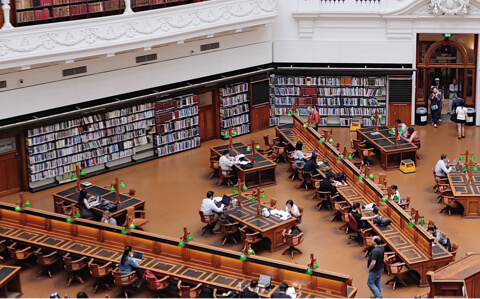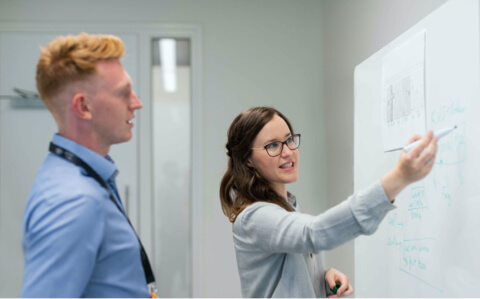Living in Australia
February 8, 2021 2024-02-19 12:12Living in Australia
Living in Australia
Living in Australia
Multiculturalism
More than 100 ethnic groups are represented in Australia, making it one of the most culturally diverse countries in the world. Australia’s dynamic multiculturalism can be attributed to its unique combination of indigenous cultures, early European settlement and immigration from all parts of the world.
Australians value the wealth of cultural diversity and social sophistication that international students bring to our campuses and communities. Melbourne Metro College takes great care in looking after international students and helping them to adjust to the Australian way of life. International students also gain great benefits from their education in Australia and make lifelong friendships.
Language
Although English is the official language, more than 4 million Australians speak a language other than English; more than 800,000 speak an Asian language, the most common being Mandarin, followed by Cantonese and Vietnamese, and another 800,000 speak a European Union language. English, as it is spoken in Australia, is easily understood by nearly all people from other English-speaking nations. While there are some minor differences in accent between the cities and country areas, the differences are much less than those found in America, Britain and Canada. As you improve your English, you will learn some of Australia’s colourful and often humorous slang, and have fun explaining the meanings to friends and relatives.
Religion
Australia is predominantly a Christian country however; all religions are represented. Australians respect the freedom of people to practice their choice of religion. Churches, mosques, temples and synagogues are located in most major cities.
Healthcare
Australia has a very good healthcare system. All Australians pay a Medicare levy (additional tax) to fund the public health system to ensure that everyone has access to public-system doctors, hospitals and other healthcare services. People who pay extra into private health insurance funds receive extra privileges when using private healthcare services. You will find the usual healthcare services available in Australian suburbs including GPs (doctors), dentists, osteopaths, chiropractors, psychologists, counsellors and many complementary healthcare practitioners too (Traditional Chinese Medicine, naturopathy, acupuncture, kinesiology etc.). International students studying in Australia are required to have Overseas Student Health Cover (OSHC) for the duration of their student visa (See, Student Visa Obligations, in this section).
Food
Australia has a fantastic variety of food. Its top-quality meat, fish, fruits and vegetables are exported to markets worldwide. There is a large range of fruit and vegetables available at Australian produce markets. Students should have no difficulty finding the foods that they are used to at home. Students can sample almost every type of cuisine in Australia’s many restaurants and cafés. Ethnic restaurants offer cuisines from all around the world. Good food at reasonable prices can be found at bistros, cafés and Aussie pubs. For those who like takeaway, most of the major global fast food chains are well represented. The adventurous might want to sample Australia’s bush tucker and national specialties like Kangaroo (available in supermarkets) and Crocodile (available in some restaurants)
Sports and recreation
Australians are very keen on sport and outdoor activities and have gained a worldwide reputation as tough competitors in individual and team sporting events. Australia has more than 120 national sporting organizations and thousands of state and regional sporting bodies. Australians are also enthusiastic about bushwalking, fishing, boating and water sports.
Electricity
The electrical current in Australia is 240/250 volts AC, 50 cycles. The Australian three-pin plug is absolutely safe. Adaptors are usually required for most foreign appliances. A transformer may be required if students bring an appliance from overseas that operates on a different voltage.
Transport
Australia has an extensive public transport system that includes trains, buses, tramways, ferries, two major national airlines and a number of regional airlines. See Living in Melbourne below for more details.
Driving : Tourist students may drive in Australia on a valid Overseas Driver’s License, but if the document is not in English, the visitor must carry a translation with the permit. An International Driver’s License alone is not sufficient.
Taxis : Metered taxicabs operate in all major cities and towns. Students can find taxi ranks at transport terminals, main hotels or shopping centers or can hail taxis in the street. A light and sign on the roof indicates if a taxi is vacant. There is a minimum charge on hiring and then a charge per kilometer travelled. You do not need to tip taxi drivers. Uber service is also available at airport and there is designated pick up place available outside airport for Uber customers.
Telephones
Australia has a modern telecommunications system with mobile and internet access generally available at low cost. Public telephones are run by Australia’s largest telecommunications company, Telstra, and are available at all post offices, shopping centers and are often situated on street corners. Telstra public pay phones accept a variety of coins and Telstra phonecards. Phonecards are pre-paid for use in public pay phones and can be bought at a large number of retail outlets such as post offices and newsagents in denominations of $A5, $A10, $A20 and $A50. Credit phones take most major credit cards such as Visa and Mastercard and can be found at international and domestic airports, central city locations and hotels. Mobile phones are very popular and can be purchased from a number of retailers including Vodafone, Optus, Virgin mobile. A local call from a payphone costs $0.50c. Calls interstate (STD) cost between $0.50c and $0.75c per minute. Calls to mobiles cost $1.00 per minute.
Budgeting
Students should work out a budget that covers accommodation, food, transport, clothing and entertainment. Childcare, if applicable, should also be taken into account. For more information on Living in Australia costs, visit www.studyinaustralia.gov.au.
Travel
During term breaks, students may like to venture beyond Melbourne to experience more of Australia’s spectacular natural environment and great physical beauty, such as great ocean road, marine parks and national parks (The Great Barrier Reef, Kakadu, Uluru), the Queensland rainforests and the pristine countryside and mountains of Tasmania. Student and backpacker travel agents in metropolitan cities offer cheap flights and package deals
Money and banks
Australian currency is the only legal tender in Australia. When students first arrive, money from other countries can be changed at the exchange facilities located at international airports, banks and major hotels. Travelers’ cheques are easier to use if already in Australian dollars, however, banks will cash travelers’ cheques in virtually any currency. Major hotels and some shops, depending on individual store policy, will also cash travelers’ cheques.
It is a good idea to set up an Australian bank account. You will need to provide visa details and evidence of residency. Banking services in Australia are extremely competitive. All major banks have branches in cities and regional centers. Major banks include ANZ, Westpac, National Bank, Commonwealth Bank. Community banks, like Bendigo Bank, are a popular alternative.
Most shopping centers have Automatic Teller Machines (ATM) facilities. These machines can be used for deposits and, in many instances, withdrawals 24-hours-a-day. Many department stores, supermarkets and specialist shops have electronic transfer terminals (EFTPOS) where cash withdrawals can also be made in addition to purchasing goods.
More information on banking is available at www.studyinaustralia.gov.au. Normal bank trading hours Monday to Thursday – 9.30 am – 4.00 pm Friday – 9.30 am – 5.00 pm Some banks are open Saturday mornings.
Credit Cards
Credit cards are widely accepted around Australia. The most commonly accepted credit cards are Visa and MasterCard.
Currency
Australia uses a dollars and cents system of decimal currency with 100 cents in a dollar. The bank notes in use are $5, $10, $20, $50 and $100. Coins used are the silver-colored 5 cent, 10 cent, 20 cent and 50 cent coins and the gold-colored $1 and $2 coins.
Tipping
Tipping is not the general custom in Australia and service charges are not added to accounts by hotels and restaurants. In good quality restaurants however, it is usual to tip food and drink waiters up to 10% of the bill for good service. Porters have set charges at railway terminals, but not at hotels. However, tipping is a matter of individual choice



